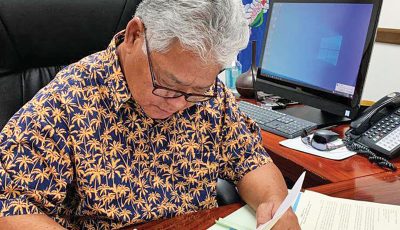House speaker: Court decision, learning experience
House Speaker Rafael S. Demapan (R-Saipan) considers the recent finding by the CNMI Supreme Court that a law providing salary increases for elective officials is unconstitutional merely shows that checks and balances in the CNMI government are working.
The high court had ruled last week that Public Law 19-83, which would have given lawmakers and other officials of the executive and judicial branches of the government an 80-percent salary increase, is unconstitutional.
“I’m happy we have this clarification and guidance from the Supreme Court. I think we can all learn from this experience. This case is a great example of the checks and balances of our government,” said Demapan, who introduced the measure, at that time pegged as House Bill 19-3.
He is also thankful for the high court for its opinion. “I’m truly thankful for the Supreme Court’s opinion in the certified question. While the court noted that the composition of the advisory commission was constitutional, it also found that the raises set forth in P.L. 19-83 exceeded the amount of the [composite price index] adjusted salary by a small amount.”
Demapan said the advisory commission recommended a $70,000 annual salary for each member of the Legislature, which was $336.15 more than the CPI’s adjusted salary of $69,663.85. “It’s a small but very significant rounding error but I totally respect the high court’s ruling.”
He added that he would now wait for the Superior Court’s decision regarding on the salary raises followed in previous laws. “Moving forward, I am eager to see precisely what the Superior Court decides to do in this case with regards to the other raises from Public Laws 4-32 and 7-31.”
“[PLs 4-32 and 7-31] were also unconstitutional because of similar highly technical issues. I’m sure the Superior Court will be fair and reasonable and, after the court rules, I’ll have much more to say at that point.”
Funds to go to community
Reps. Joseph Leepan T. Guerrero (R-Saipan) and Angel A. Demapan (R-Saipan) said there’s a provision in the legislation that would return the appropriated money back to the community. Both Precinct 1 lawmakers had voted in favor of the salary increase.
“That money is going back to the community. There’s language in the bill and budget, in the event that, after six months and the Supreme Court have yet to issue a decision, then the money would go to an agency,” said Guerrero, chairman of the House Committee on Commerce and Tourism.
He added the Legislature could not touch the money allocated for the salary increase, which remains under the care of the local Department of Finance.
Guerrero said his salary increase could have been used for his constituents in Precinct 1 for tents, tables, and their other needs. “You would have seen that go back to the community since your constituents will come to you for assistance. I have to say that I’m forking out [money from] my own pocket to assist my constituents in Precinct 1.”
Guerrero said he’s also using the constitutionally mandated budget for the operations of his office that included the salaries of the staff of each legislator. Each member of the Legislature is allocated an operational budget of $90,000 annually.
Article II Section 16 (b) of the CNMI Constitution states that “each member of each House shall receive an equal amount within this ceiling not to exceed $155,000 annually for office and related expenses including all expenses for travel. Members may voluntarily pool all or any part of these funds.”
Demapan added that they had included in the fiscal year 2019 budget a provision that the money would go to an agency like the Commonwealth Healthcare Corp.
“I’m grateful that the court has finally made a decision on this matter. As we negotiated in the current budget, in the event the high court rules unfavorably, the funds for this purpose would go to CHCC to help defray the costs incurred as a result of uncompensated care and other services.”



























